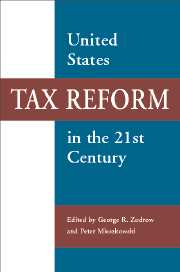Book contents
- Frontmatter
- Contents
- List of Contributors
- Preface
- 1 Introduction: The Fundamental Question in Fundamental Tax Reform
- 2 Behavioral Responses to a Consumption Tax
- 3 The Economic Impact of Fundamental Tax Reform
- 4 Capital Income Taxation in Tax Reform: Implications for Analysis of Distribution and Efficiency
- 5 International Aspects of Fundamental Tax Reform
- 6 Distributive Analysis of Fundamental Tax Reform
- 7 The Role of Administrative Issues in Tax Reform: Simplicity, Compliance, and Administration
- 8 Evaluating the National Retail Sales Tax from a VAT Perspective
- 9 Transitional Issues in the Implementation of a Flat Tax or a National Retail Sales Tax
- 10 Historical and Contemporary Debate on Consumption Taxes
- 11 The Politics and Ideology of Fundamental Tax Reform
- Bibliography
- Index
Preface
Published online by Cambridge University Press: 23 October 2009
- Frontmatter
- Contents
- List of Contributors
- Preface
- 1 Introduction: The Fundamental Question in Fundamental Tax Reform
- 2 Behavioral Responses to a Consumption Tax
- 3 The Economic Impact of Fundamental Tax Reform
- 4 Capital Income Taxation in Tax Reform: Implications for Analysis of Distribution and Efficiency
- 5 International Aspects of Fundamental Tax Reform
- 6 Distributive Analysis of Fundamental Tax Reform
- 7 The Role of Administrative Issues in Tax Reform: Simplicity, Compliance, and Administration
- 8 Evaluating the National Retail Sales Tax from a VAT Perspective
- 9 Transitional Issues in the Implementation of a Flat Tax or a National Retail Sales Tax
- 10 Historical and Contemporary Debate on Consumption Taxes
- 11 The Politics and Ideology of Fundamental Tax Reform
- Bibliography
- Index
Summary
Tax reform debates in the United States have for some time been dominated by the question of whether the existing corporate and individual income tax system should be replaced with some form of a national consumption tax. Although opinion is far from unanimous, a wide variety of individuals in the academic, business, and government communities has long advocated such a reform, and Congress has recently been inundated with a host of consumption-based tax reform proposals. Nevertheless, the likelihood of passage of such “fundamental tax reform” currently does not seem particularly high. Thus a natural question is why the enactment of a consumption-based tax does not appear to be a viable tax reform option for the new millennium, despite the fact that the virtues of consumption taxation have been actively promoted, at least in some circles, for more than twenty-five years.
This critical issue is addressed in this volume, which contains essays by a group of internationally recognized tax experts who describe the current state of the art in economic thinking on the issue of whether fundamental tax reform is preferable to continued incremental reform of the existing income tax. The ten essays were commissioned by the James A. Baker III Institute for Public Policy at Rice University and were initially presented at a conference on Tax Reform for the Millennium held on November 5–6, 1998, at the Baker Institute on the campus of Rice University in Houston.
- Type
- Chapter
- Information
- United States Tax Reform in the 21st Century , pp. xi - xiiPublisher: Cambridge University PressPrint publication year: 2002

